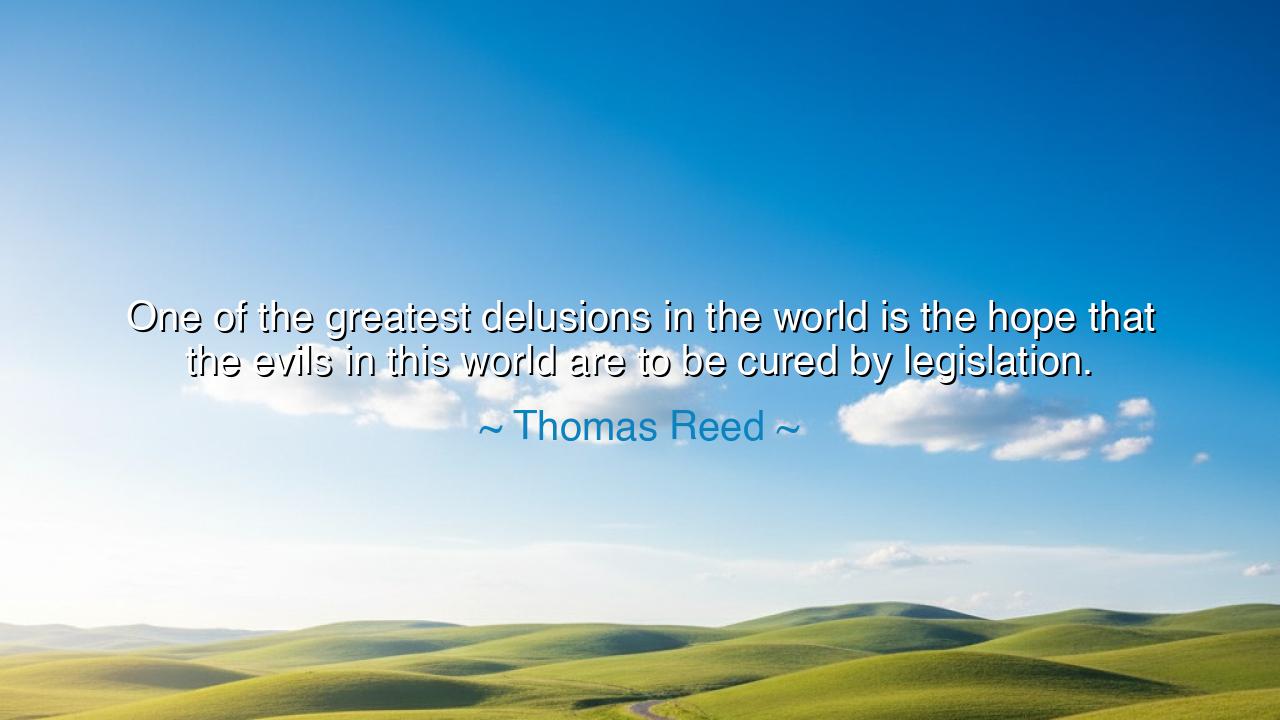
One of the greatest delusions in the world is the hope that the
One of the greatest delusions in the world is the hope that the evils in this world are to be cured by legislation.






The words of Thomas Reed, “One of the greatest delusions in the world is the hope that the evils in this world are to be cured by legislation,” strike with the force of timeless truth, as though spoken not by a statesman, but by a philosopher reflecting on the nature of humanity itself. In this single sentence, Reed unveils a truth that transcends governments, eras, and empires—that law, though powerful, cannot heal the heart of man. For the roots of evil do not lie in the statutes of nations, but in the souls of individuals. No parchment, no decree, no law written by mortal hand can alone extinguish greed, hatred, or cruelty. To believe otherwise, he warns, is one of mankind’s greatest delusions.
Thomas Brackett Reed, who served as Speaker of the United States House of Representatives in the late nineteenth century, was known as a man of intellect and sharp wit. He lived in a time of political tumult, when America struggled with corruption, inequality, and the growing pains of democracy. Reed’s insight did not come from cynicism, but from observation. He saw legislators passing law after law, believing that order could be imposed where virtue was lacking. Yet he knew that legislation could restrain the hand, but not reform the heart. It could punish evil, but not cure it. For laws are but the bones of civilization—without moral spirit, they are lifeless and brittle.
To understand Reed’s wisdom, one must look deep into the history of humankind. For millennia, rulers and lawmakers have sought to craft perfect societies through codes and commandments. The ancient Babylonians carved their justice into stone under Hammurabi’s Code. The Romans wrote laws that shaped the Western world. Kings, emperors, and parliaments have filled libraries with decrees. Yet through all these ages, evil has not vanished—it merely changes its form. Tyranny gives way to corruption, slavery to exploitation, and oppression to apathy. The lesson is clear: no law can save a society whose people lack virtue, compassion, and conscience.
Consider the example of Mahatma Gandhi and India’s struggle for freedom. The British Empire ruled with laws—many laws, all written, all enforced. Yet those laws, however elegant on paper, became instruments of oppression because they were divorced from justice. Gandhi understood what Reed declared centuries before: that the moral regeneration of a people must come not through the rulebook of government, but through the awakening of conscience. Gandhi’s victory was not won by rewriting laws, but by transforming hearts through truth and nonviolence. When the soul of a nation rises, the laws follow; when the soul decays, even the best laws crumble.
This is the eternal paradox of civilization: laws can guide behavior, but only character can create harmony. A dishonest man will twist the law to his advantage; a just man will uphold its spirit even at his own cost. Legislation may set boundaries for conduct, but morality sets the direction of the soul. Thus, Reed reminds us that the true battlefield for justice is not the courtroom, but the human heart. The evil in the world is not a creature of law—it is born from envy, pride, fear, and ignorance. These cannot be imprisoned by statute; they must be overcome by wisdom, love, and self-discipline.
This truth may seem disheartening to those who long for quick remedies and sweeping reforms. Yet in it lies a deeper hope. For if evil cannot be erased by government, then its defeat lies within reach of every individual. The poor man and the king, the student and the soldier—all have the power to shape the moral destiny of the world through their choices. The great revolutions of spirit—whether led by prophets, poets, or reformers—begin not in parliaments, but in hearts that refuse to hate. When a man governs himself with justice, he becomes a living law unto the world.
The lesson, therefore, is this: do not wait for laws to perfect the world—perfect yourself first. Strive to be just, even when the law is silent; to be kind, even when the law is cruel; to be truthful, even when falsehood is rewarded. Teach virtue by example, not by decree. Raise children not merely to obey, but to understand why goodness is worth the cost. Let your conscience be stronger than any constitution. For in the end, it is not the law that uplifts the world, but the character of those who live within it.
So remember, as Reed wisely declared, that legislation is a tool, not a savior. It may fence the field of life, but it cannot make the flowers grow. That work belongs to the gardener of the soul—to you, to me, to every human being who dares to plant seeds of virtue in the soil of imperfection. And when enough hearts are purified by wisdom, the laws of men will at last reflect the laws of heaven.






AAdministratorAdministrator
Welcome, honored guests. Please leave a comment, we will respond soon